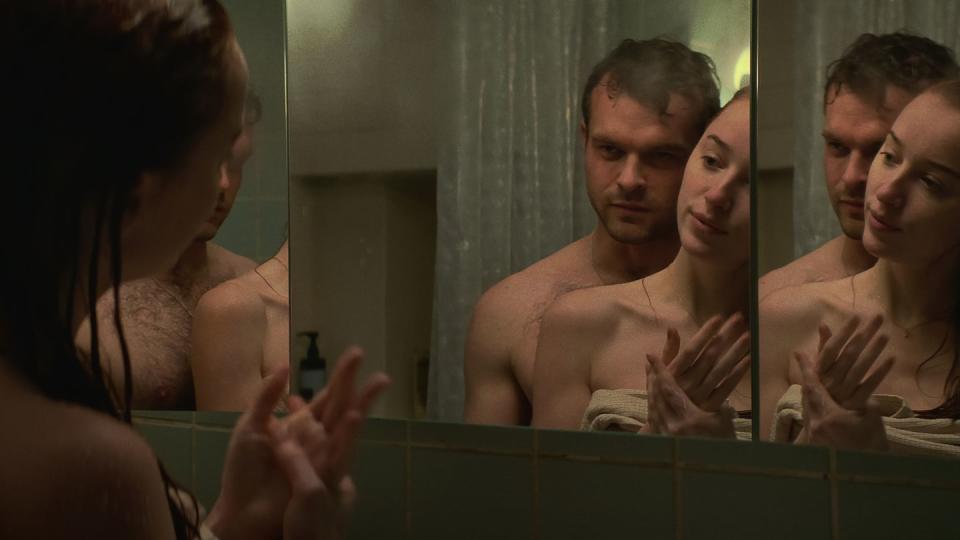Here's What You Need To Understand About 'Fair Play's Ending

Warning: Mentions of sexual assault, and Fair Play spoilers ahead.
Netflix's newest psychological thriller, Fair Play, forces its audience to sit in a whole lot of discomfort. When Emily (Phoebe Dynevor) is unexpectedly promoted over her fiance, Luke (Alden Ehrenreich), at their cutthroat hedge fund, tensions build—leading up to a surprising and thrilling final scene, complete with literal blood, tears, and a lot of confusion about where things stand for the couple.
Director Chloe Domont tells Women's Health that she worked hard to create this unique, complicated tension for her audience.
"I didn't want to make something where there's a clear villain or a clear hero," Domont tells WH's Editor-in-Chief Liz Plosser during a Q&A at Montclair State University, which was broadcast on WMSC 90.3. "I wanted to create this pressure cooker. This ticking time bomb thriller where you don't know when it's going to pop."
Exploring toxic gender dynamics through a forbidden inter-office relationship is no cake walk, but Domont does it masterfully. And you can't understand the movie's ending unless you understand the complexity of Domont's choices throughout each scene.
Below, she gives WH the inside scoop on what it all means, and the creative process that catapulted the intense two-hour film into a hit, and how it all builds up to a memorable ending.
Understanding the first scene is essential to getting what happens at the end.
If you've already seen Fair Play, you know the film draws blood right from the beginning. The opening scene depicts a sex scene between Luke and Emily that is interrupted by Emily's period. She unknowingly menstruates all over Luke's face just before he tastefully segues into an impromptu marriage proposal.
"I like to be grabbed by the throat within the first five minutes when I'm watching a movie," she tells WH of the bold first scene choice.
The scene also establishes that Luke is far from a cut-and-dry misogynist. He's a complicated man with layers.
"I wanted to set up that this guy isn't threatened by her," Domont explains. "He has her blood on his face, and he's laughing about it, and he's not grossed out by it. It's just a normal thing."
The scene also hints at what's to come: Domont gets her audience to fall in love with the idea of this perfect couple from the very start. But she also teases something more sinister with the blood.
"The visual metaphor for the blood is definitely foreshadowing for the violence to come," she says.
The characters develop a 'poisonous energy' that sets up the finale.
Soon after Emily receives her promotion, Domont intentionally shows both characters pushing down their true feelings. While Emily hides information that she thinks will bruise Luke's ego (until a pivotal fight scene), Luke also hides his insecurity about Emily's success at work.
"The reason why there is so much tension is that neither [Emily or Luke] can admit to themselves, let alone to each other, about what [they feel] is going on," she says. "They both push it down and it simmers into this poisonous energy... So the first time they lash out—the levels of explosive nature—[the viewer] is like, 'Finally.'"
There's also an interesting tension in Luke's growing resentment, because the things that make him jealous of Emily are also the reasons he loves her, Domont explains.
"He adores Emily because she's a killer—that's why he's attracted to her," she says. "But at the same time, there are some things that, because of how he was raised, make him feel threatened by her."

By this, Domont is referring to Luke's view of gender roles in a relationship, which she says are a result of the society in which he was raised, rather than a character flaw. "It doesn't make him a bad guy for having those [resentful] feelings," Domont tells WH.
In an interview with Rolling Stone, Domont also said that the couple's dynamic was inspired by her own work experience, where men felt threatened by her success.
"I was having at a certain point in my life when my success, or any moments of accomplishment I had, didn’t feel like a win," she told Rolling Stone. "It felt like a loss. And it was because the men I was dating at the time felt threatened by me in some way."
What happens at the end of Fair Play?
Fair Play ends how it begins: with blood.
This time, after sexually assaulting Emily, Luke decides to leave her for a new job in San Francisco. When she finds out, Emily pulls a knife on him. She asks him to admit wrongdoing and slices his arm when he won't comply. Luke kneels on the ground and apologizes for everything he has done.
Domont says this is the only way Emily can regain power after Luke sexually assaulted her.
What does the ending mean?
When Luke rapes Emily toward the end of the film (they're having sex, she asks to stop, he doesn't stop), it's his last attempt to regain dominance over her after her promotion, Domont told Rolling Stone.
"Rape is not really about sex," she said. "It's about power."
To Domont, Emily forcing Luke to kneel before her and admit his wrongs in the final scene is the film's whole thesis: She's making him confront his actions and recognize her power.
"While there are elements of female rage, the last scene is not about female revenge, it’s about holding a man accountable and getting him to face his own inferiority," Domont told Netflix. “Luke’s inability to own up to that causes both of them so much pain and so much destruction."
What happen to Luke and Emily after Fair Play?
While the scene cuts to black before any real resolution between the two, Domont believes that both are able to learn from their relationship together and never repeat the mistakes made in the film, per Netflix.
For Emily, that means never dating someone like Luke again. For Luke, that means he's actually realized his mistake. She hopes he won't continue to "fail upward," Domont told Netflix. Sadly, audiences won't get any more resolution than that, and don't expect a Fair Play sequel.
Domont told Rolling Stone her next film will be an indie, and likely in an entirely different genre. But she'll probably continue to explore similar types of stories, she told Women's Health.
"Once I found this story, I think it unlocked a lot of clarity in terms of the type of films I want to make," she says.
You Might Also Like

